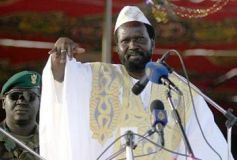UN peacekeepers divide Sudanese government partners
July 2, 2006 (KHARTOUM) — Sudanese President Omar al-Bashir’s opposition to the deployment of UN peacekeepers to the troubled western region of Darfur has deeply divided the government of National Unity formed after the signing of the Comprehensive Peace Agreement last year.
 First Vice President Salva Kiir, who heads the Sudan People’s Liberation Movement (SPLM) which waged a deadly two-decade war against government troops in the south that ended with the January 2005 deal, sharply distanced himself from Bashir by calling on the Security Council to deploy the UN force.
First Vice President Salva Kiir, who heads the Sudan People’s Liberation Movement (SPLM) which waged a deadly two-decade war against government troops in the south that ended with the January 2005 deal, sharply distanced himself from Bashir by calling on the Security Council to deploy the UN force.
Before signing up to a peace agreement that speaks of autonomy for the south and adjacent disputed areas only, the SPLM used to champion the rights of all Sudan’s “marginalised minorities”, including the myriad non-Arab groups of the Darfur and the eastern Beja, as well as southern Christians and animists.
A first rebellion by ethnic minorities in Darfur, which ended with a 1989 peace conference, was backed by the SPLM. “The position of the SPLM is obvious and has no problem with the deployment of international forces in Darfur,” Kiir told a rally in the main southern city of Juba on Friday.
“We have previously expressed our agreement to the deployment of those forces in accordance with the (2005) agreement,” he said, referring to an existing UN force deployed in the south under the CPA. “We do not see any problem in their presence in Darfur, as, since entering south Sudan, they have not committed any violation and they have remained committed to all provisions of the Comprehensive Peace Agreement.
“We have notified the (ruling) National Congress Party of our agreement,” he added in reference to the president’s northern, Islamist-dominated ruling party.
Under the 2005 accord, Beshir’s ruling party shares power in Khartoum with the former rebels and other smaller factions on the basis of a formula set out in the deal.
But the president, who originally came to power in an Islamist-backed military coup in 1989, has so far strongly resisted Western plans for a Nato-backed UN force to deploy to Darfur.
The largest Darfur rebel faction hailed the support from the southern former rebels for a more robust peacekeeping force than the existing 7 000-strong African Union contingent that has struggled to patrol a vast desert region the size of France.
“Yes, as Sudanese, we are for the sovereignty of the country,” said Abdel Karim al-Sheikh, envoy of the mainstream faction of the rebel Sudan Liberation Movement (SLM). “But we support the deployment of international forces to help implement the Darfur peace agreement provisions related to protecting civilians,” he told the Khartoum daily Akhbar al-Youm.
(ST)
